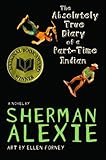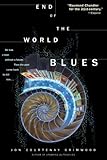 The Absolutely True Diary of a Part-Time Indian by Sherman Alexie
The Absolutely True Diary of a Part-Time Indian by Sherman AlexieEven though this is a 'young adult' novel, I found it very touching. It is the story of young Arnold, a Native American living on 'the rez' in NE Washington. He is bright, and is encouraged by a teacher to go to the 'white' high school in nearby Reardan. There, of course, he doesn't fit it, but now that he's not going to school on the rez, he's also ostracized by many of former friends.
This is a moving coming-of-age story, which manages to show us the poverty and struggles of life on the rez without being maudlin. It has a similar, boyhood-friend feeling as Stephen Kings' Stand By Me, and even though it is set against the backdrop of life on the rez, this is a story that anyone, male or female, white or Native American, can enjoy. I laughed more than I cried, but I did cry.
I also had the pleasure of hearing Alexie speak twice in the past 2 months. Once at the Port Townsend Film Festival, where he introduced a film, and most recently as part of the "Spokane Is Reading" event, where he read from this book. (Ahem, and it was my copy he read from!) If you ever get a chance to hear him speak - GO!




















